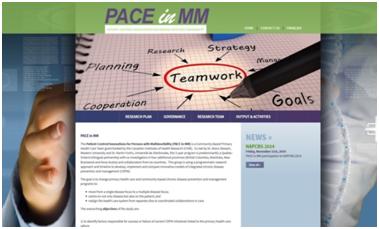February 27, 2015 – 10:13 am
By Donna Zulman

Patients with multiple chronic conditions (MCCs) face substantial self-management challenges related to having multiple health issues. For example, patients with MCCs frequently face unwieldy medication regimens and daily self-care routines that may reduce adherence to recommended treatment plans. They also often need to track and coordinate health information from different health care providers and monitor and distinguish between symptoms from different diseases. As a result, there is a great need for effective tools to support the self-care activities associated with multimorbidity. Patient-facing “eHealth” technology may provide opportunities to address these patients’ needs.
We conducted a qualitative study [1] (published in the Journal of General Internal Medicine) with patients with MCCs to explore their self-management and health care navigation challenges, and to identify opportunities to support these patients through new and enhanced eHealth technology. Three themes emerged to guide eHealth technology development: (1) Patients with MCCs manage a high volume of information, visits, and self-care tasks; (2) they need to coordinate, synthesize, and reconcile health information from multiple providers and about different conditions; and (3) their unique position at the hub of multiple health issues requires self-advocacy and expertise. Focus groups identified desirable eHealth resources and tools that reflect these themes.
The abstract of the article can be found at http://www.ncbi.nlm.nih.gov/pubmed/25691239
1) Zulman DM, Jenchura EC, Cohen DM, Lewis ET, Houston TK, Asch SM. How can eHealth technology address challenges related to multimorbidity? Perspectives from patients with multiple chronic conditions. J Gen Intern Med. 2015 [Epub ahead of print]).
February 20, 2015 – 2:32 pm
By Martin Fortin and Moira Stewart

The research team PACE in MM “Patient-Centred Innovations for Persons with Multimorbidity” is happy to report its website (www. paceinmm.recherche.usherbrooke.ca) is now online in both French and English. The site outlines the PACE in MM research goals, objectives and research plan.

Visitors to the site are able to view the governance, type and structure of Committees within the team as well as review the research team members. A glossary of key terms related to the topic areas of PACE in MM is presented.
This resource will also allow visitors to keep updated on current news and events. A special section for output and activities will be updated regularly outlining presentations, publications, and meetings. A link to other helpful resources has also been developed.
If you have any suggestions or feedback for the website please send your comments to Research Coordinators, Tarek and Louisa.
Tarek.Bouhali@usherbrooke.ca
Louisa.Bestard-Denomme@schulich.uwo.ca
February 6, 2015 – 10:10 am
By Emma Wallace and Susan Smith

Along with colleagues in the UK, we have recently published a Clinical Review on managing patients with multimorbidity in primary care in the BMJ [1]. The review outlines challenges for Family Physicians or General Practitioners (GPs) in care delivery. We identified areas where GPs experience difficulties in caring for patients with multimorbidity and suggest evidence-based practice management strategies:
1. Disorganisation and fragmentation of care.
Identify patients as having complex multimorbidity and adopt a practice policy of continuity of care for these patients by assigning a named GP to the patient. Consider the following groups; a) Patients with ‘complex’ multimorbidity defined as ≥3 chronic conditions affecting ≥3 body systems; b) Patients with comorbid physical conditions and depression; c) Patients prescribed ≥10 medications; d) Patients who are housebound or resident in nursing homes.
2. Inadequacy of current disease-specific guidelines.
At times, clinical judgement may mean an acceptance that in certain circumstances, pursuing stringent disease specific targets is unlikely to be beneficial and may in fact be harmful. Consider an approach of targeting function not disease and a focus on medicines management, including deprescribing where possible.
3. Challenges in delivering patient centred care and barriers to shared decision making. Asking a patient at the outset of a consultation ‘What is bothering you most?’ or ‘What would you like to focus on today?’ can help prioritise management of aspects of care that will have most impact for the patient. Once patient priorities are identified, using available shared decision making tools may help support the process. Patient preference should guide the utilisation of lay-led self-management groups.
4. Consultation time.
Consider adopting a practice policy of routine extended or ‘specific extended’ consultations for particularly complex patients. Ensure practice systems are in place to maximise the value of the GP consultation for both patient and doctor in reaching management decisions. Multidisciplinary team involvement is important and should be arranged where appropriate.
Reference
1) Wallace E, Salisbury C, Guthrie B, Lewis C, Fahey T, Smith SM. Managing patients with multimorbidity in primary care. BMJ 2015;350:h176.




